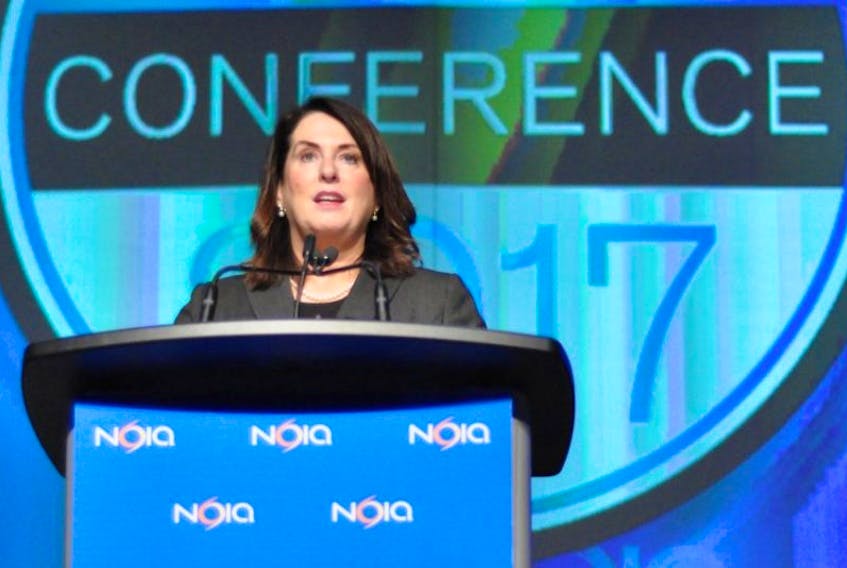Well, it’s oil and gas show time again, and like every year, the provincial government has joined the petro-chorus.

The Noia 2018 oil and gas conference was this past week, and, like most years, it’s a convention of the like-minded.
And because it’s all the same song, the media tends to echo the one note it hears: “It takes too long for projects to get underway,” “The regulations are too complex,” “Development is handcuffed.”
Oh, and the always popular, “Super-massive mega oilfield just on the horizon.”
You don’t hear much about the carbon footprint of oil development, or the greenhouse gas emissions of offshore installations. There aren’t panel discussion on the need for new environmental oversight to protect seabirds, or examining the effects of seismic testing.
Premier Dwight Ball echoed the “oil’s well that pays well” tone on Tuesday, saying that oil development here faces a “very exhaustive, complicated, long and enduring regulatory regime.”
Not to worry, though: “We are dedicated to creating an environment of success, for this province, and for industry partners alike.”
The Noia 2018 oil and gas conference was this past week, and, like most years, it’s a convention of the like-minded.
He’s not the only provincial cheerleader.
“We’re faced with challenges that are man-made. They’re self-inflicted,” said Nalcor oil and gas vice-president Jim Keating. He pointed to delays of up to three years for some projects, saying, “It’s off the chart in terms of being a non-competitive situation.”
It’s a regular message, and one the provincial government doesn’t just talk about.
Last February, the province announced it wanted to change regulations to speed up and expand offshore development.
You can understand hearing it from oil executives. But why are provincial politicians and officials so clearly on board, especially because they have a role in regulating the offshore?
And should we take the province’s involvement with a grain of salt?
We should — and not just because the provincial government needs oil money so badly that it’s essentially complicit. (On that front, the provincial government’s delight in new fields borders on the celebratory tone of a drug addict being handed their next fix.)
We should take it with a grain of salt because the province is not only a partner in several oil projects, but also contractually bound to side with, and support, the oil companies.
Look, for example, at the Hebron development agreement, signed with great flourish by then-premier Danny Williams, Kathy Dunderdale and Ed Martin.
The provincial government has guaranteed its support to the oil companies involved in a variety of ways: the province agreed to “assist and support each of the proponents in seeking modification for federal fiscal enhancements,” for example.
But pay careful attention to clauses 5.1 B and C.
“5.1— Support of Province.
“The Province shall, on the request of the Proponents … (B) use all reasonable efforts to assist the Proponents in securing commitments from Canada and municipal governments in the Province regarding the legal and regulatory framework applicable to a Development Project; and (C) support the efforts of the Proponents in responding to any future legislative and regulatory changes that may be proposed by Canada or a municipal government in the Province that might adversely affect any Development Project, provided such action does not negatively impact the Province or require the Province to take any legislative or regulatory action respecting municipalities.”
In other words, the oil companies didn’t just get a provincial partner to share in the costs and benefits of oil development. They also got a pet cheerleader, ready to speak up against any regulatory or legislative changes that the oil companies might not like, and to “use all reasonable efforts” to support those same oil companies in getting legislative changes the oil companies want.
So, keep in mind, the provincial government’s support is more than the obvious necessity of a steady flow of petrodollars to keep the government afloat.
It’s a contractual obligation.
And it’s a contractual obligation that we should keep in mind absolutely every single time we hear a provincial politician or official saying they want faster regulation for oil projects, or, worse still, provincial regulation of oil projects.
It would be perfectly safe and environmentally friendly, I’m sure, to have the fox fast-tracking approvals for the regulation of chickens.
Russell Wangersky’s column appears in 39 SaltWire newspapers and websites in Atlantic Canada. He can be reached at [email protected] — Twitter: @wangersky.
•••
Have your say
Want to wade into the debate? Write a letter to the editor and email it to [email protected] Be sure to include a name, address and daytime telephone number where the author can be contacted. Ideally, letters should be no more than 500 words, to a maximum of 700 words.









